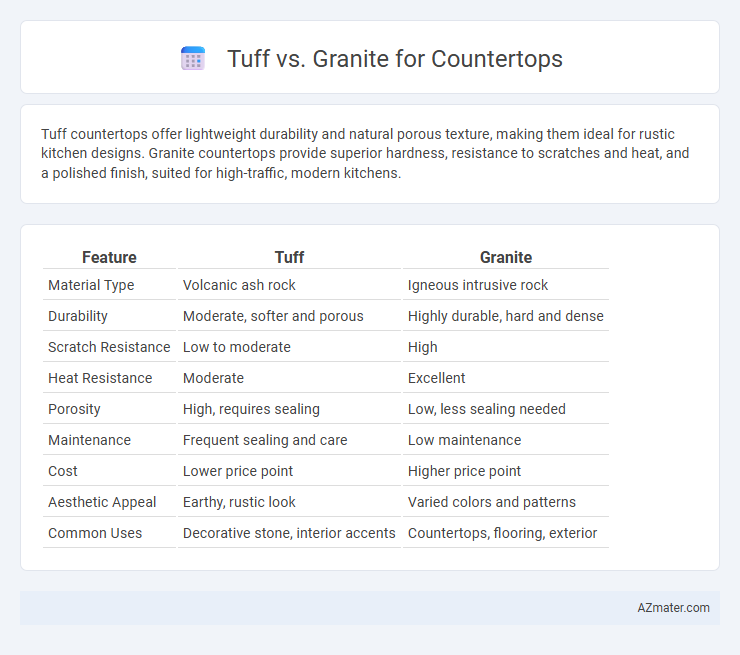Tuff countertops offer lightweight durability and natural porous texture, making them ideal for rustic kitchen designs. Granite countertops provide superior hardness, resistance to scratches and heat, and a polished finish, suited for high-traffic, modern kitchens.
Table of Comparison
| Feature | Tuff | Granite |
|---|---|---|
| Material Type | Volcanic ash rock | Igneous intrusive rock |
| Durability | Moderate, softer and porous | Highly durable, hard and dense |
| Scratch Resistance | Low to moderate | High |
| Heat Resistance | Moderate | Excellent |
| Porosity | High, requires sealing | Low, less sealing needed |
| Maintenance | Frequent sealing and care | Low maintenance |
| Cost | Lower price point | Higher price point |
| Aesthetic Appeal | Earthy, rustic look | Varied colors and patterns |
| Common Uses | Decorative stone, interior accents | Countertops, flooring, exterior |
Introduction to Tuff and Granite Countertops
Tuff countertops are made from compact volcanic ash, offering a lightweight yet durable surface with natural porous textures that enhance design aesthetics. Granite countertops, formed from slow-cooled molten rock, provide exceptional hardness and resistance to scratches and heat, making them a popular choice for kitchens. Both materials feature unique mineral compositions that influence their color variations and maintenance requirements, with granite generally offering higher density and less porosity compared to tuff.
Geological Origins of Tuff and Granite
Tuff is an igneous rock formed from volcanic ash ejected during explosive eruptions that compacts and solidifies over time, resulting in a relatively porous and lightweight material. Granite, a coarse-grained intrusive igneous rock, forms deep within the Earth's crust from the slow crystallization of magma rich in quartz, feldspar, and mica, yielding a dense and durable surface. The contrasting geological origins contribute to differences in texture, hardness, and suitability for countertops, with granite offering superior hardness and resistance to wear compared to the softer, more porous tuff.
Physical Properties Comparison
Tuff countertops exhibit lower hardness and density compared to granite, resulting in a softer surface prone to scratches and dents. Granite is significantly more durable, with high resistance to heat, scratches, and impact due to its granular crystalline structure and hardness rating of 6-7 on the Mohs scale. The porosity of tuff is generally higher, making it more susceptible to staining and moisture absorption, whereas granite's dense composition offers superior resistance to water and stains.
Aesthetic Differences and Color Options
Tuff countertops offer a natural, earthy appearance with a wide range of warm tones, including beige, brown, and subtle green hues, providing a rustic yet elegant look. Granite countertops showcase a broad spectrum of vibrant colors like black, white, pink, and blue, featuring intricate veining and patterns that enhance luxury and visual depth. The choice between Tuff and Granite depends on the desired aesthetic, with Tuff emphasizing organic warmth and Granite delivering striking color variety and complexity.
Durability and Longevity
Granite countertops are renowned for their exceptional hardness and resistance to scratches, heat, and stains, making them highly durable and suitable for heavy kitchen use. Tuff, a type of volcanic rock, offers good durability but is generally softer and more porous than granite, requiring more frequent sealing and maintenance to prevent damage. Over time, granite maintains its structural integrity and polish better than tuff, ensuring longer-lasting performance in countertop applications.
Maintenance and Cleaning Requirements
Tuff countertops require minimal maintenance due to their non-porous surface, making them resistant to stains, scratches, and bacteria buildup, which simplifies cleaning with just mild soap and water. Granite countertops need regular sealing, typically once a year, to prevent moisture penetration and staining, and should be cleaned with pH-balanced, non-abrasive cleaners to maintain their polished finish. Both materials benefit from prompt spill cleanup to preserve their appearance and durability, but Tuff offers a more hassle-free, low-maintenance option for busy kitchens.
Cost Analysis: Tuff vs Granite
Tuff countertops generally cost 20-40% less than granite, making them a budget-friendly alternative for homeowners seeking natural stone aesthetics. Granite prices typically range from $40 to $100 per square foot, depending on color and rarity, while tuff averages $25 to $60 per square foot. Maintenance and durability factors also affect long-term costs, with granite requiring periodic sealing and offering greater resistance to scratches and heat compared to tuff.
Environmental Impact and Sustainability
Tuff countertops, made from volcanic rock, have a lower environmental impact due to their natural formation and minimal processing compared to granite, which requires extensive quarrying and energy-intensive cutting. The renewable nature of tuff and its lighter weight contribute to reduced transportation emissions, enhancing its sustainability profile. Granite's durability and longevity also support sustainability by reducing the need for frequent replacements, but its extraction often disrupts ecosystems and generates significant waste.
Best Applications and Use Cases
Tuff countertops excel in lightweight, cost-effective applications with moderate durability, making them ideal for residential kitchens and bathroom vanities where budget and ease of installation are priorities. Granite offers superior hardness, heat resistance, and scratch durability, perfectly suited for high-traffic kitchen countertops, commercial environments, and outdoor kitchens exposed to extreme weather. Choosing between Tuff and granite depends on balancing the need for durability and aesthetic appeal against installation convenience and cost constraints.
Pros and Cons: Tuff vs Granite Countertops
Tuff countertops offer lightweight durability and resistance to heat and stains but may be more prone to scratching and chipping compared to granite. Granite countertops provide exceptional hardness, scratch resistance, and longevity, though they require periodic sealing to prevent staining and can be heavier and more expensive. Both materials present unique aesthetic qualities, with tuff offering a softer, more uniform look and granite showcasing natural veining and color variations.

Infographic: Tuff vs Granite for Countertop
 azmater.com
azmater.com